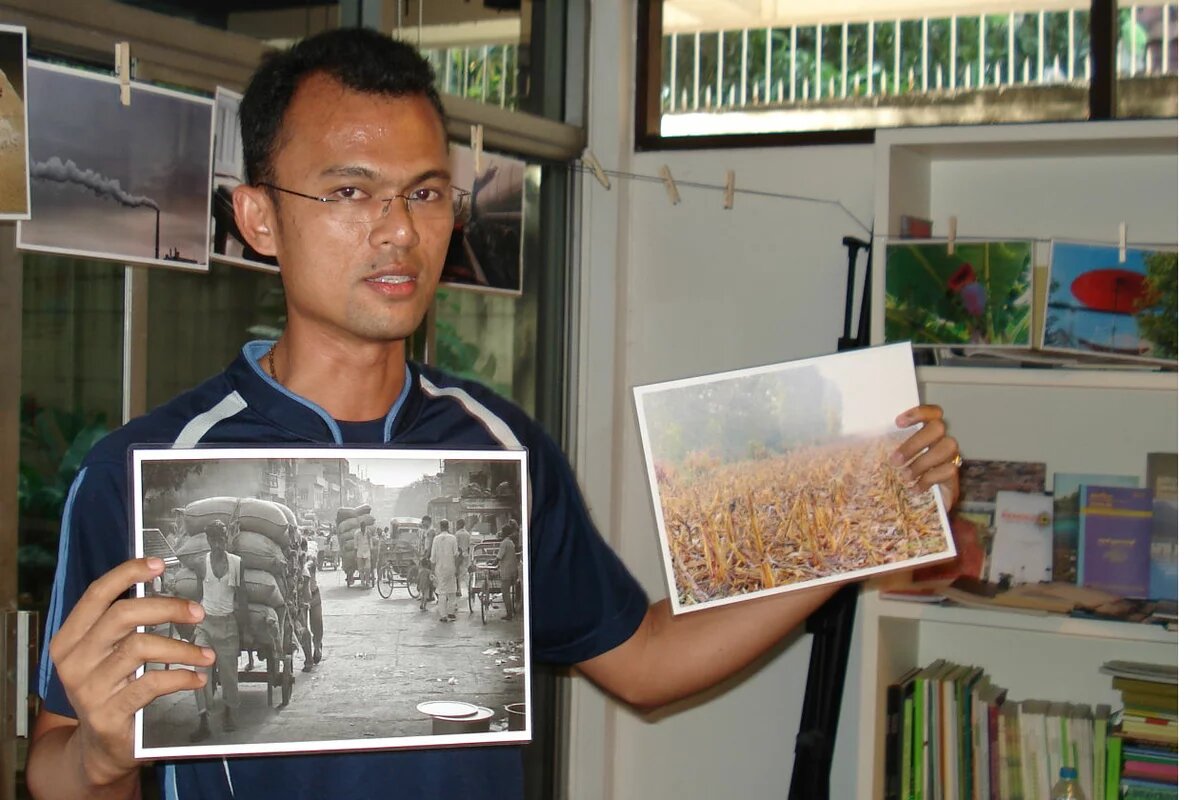
The future workshop in Bangkok was a lively, interactive, and demonstrative workshop. Participants from countries in the region with various background brought different experiences and perspectives. Problems of and solutions for different resource sectors were discussed. For three resource sectors, namely, land, energy, and extractive industry, thorough plans of action were developed.
Despite the workshop's overall good outcome, this essay aims to provide some reflections pointing out contradictions and controversies that occurred in the workshop and that also appeared in the article that was given prior to the workshop, "To Have or Have Not: Resource Equity in a Finite World". We will start with the reflection on the article first, then, on the content of the workshop.
1. Reflections on the Article
The article is very comprehensive. It is trying to sketch the current situation of resources from the local to the planetary level, and from various perspectives, with resource equity as a central theme. It also draws readers' attention to the existing solutions and their critiques, and argues that resource politics needs to be considered an important part of any solution since it plays a crucial role in policy and other decision making processes that govern appropriation and distribution of resources and distribution of its benefits and costs. Concept of the commons was brought up at the end, and emphasized as an alternative paradigm to any resource governance strategy for the 21st century. Our reflections will be focused on the commons since the concept is used extensively in our research.
The first point is about the concept of the commons. The article mentioned that the word 'commons' has two fundamentally different conceptions, one of which relates to the characteristics of the resource and the other which refers to relationships between the resource and the users. It is necessary to be clear about the characteristics of the commons and distinction between the commons and the common property rights.
In the commons research, "the commons" is a short term for common-pool resource. The common-pool resource refers to a type of goods having two characteristics (cf. Ostrom 2002). The first characteristic is that it is difficult to exclude beneficiaries from using the resource, even if they do not pay the cost of maintenance. Thus the resource users have no incentive to take care of the resource and the most economically rational decision is to appropriate the resource as much as possible before others do, leading to the Tragedy of the Commons. The second characteristic is that it is subtractable, which means that once resource units are extracted, fewer amounts of the units are left for others.
A resource is not necessary a commons, thus the commons-based governance is not necessarily appropriate for all resources. The exclusion difficulty depends on specific characteristics of the resource and the technology and resources required in the process of appropriation. Extractive resources such as oil or minerals require some technology and great amount of labor and monetary capital to extract. It is not easy for anyone to sneak in and extract crude oil. As for electricity, a type of energy, it is relatively easy to exclude those who do not pay the electricity bill from using it, due to the technology used for accessing it. Cultural resources and free software are not subtractable since consuming cultural resource or downloading free software does not reduce ability of others to consume or download. This is why these resources have different types of governance: The extractive resource industry uses concessions to privatize the property rights, electricity companies use price mechanisms, and providers of cultural resource or free software use club, registration or entry fee.
The production and distribution of resources are complex and multi-level. However, the knowledge of commons governance is relatively settled at the community level, but still under debate when it comes to higher-level governance (cf. Ostrom 2010). For example, the energy policy in the Mekong river basin is not only about regional energy policy but also about multi-level water governance over the river, ranging from the local to regional level. In addition, it also involves fisheries and water management for agriculture. The knowledge of the small-scale commons has been relatively settled for some time (cf. Ostrom 1990; Ostrom et al. 2002; Agrawal 2002), however, it is still debatable whether the lessons from small-scale commons can be extrapolated to higher-level governance. In this regard, knowledge on polycentric governance (cf. Huitema et al. 2009; Ostrom 2010; Lebel et al. 2006), adaptive co-management (cf. Armitage 2005; Armitage et al. 2009; Plummer 2009), and the 'Earth System Governance' (cf. Biermann 2007; Biermann et al. 2009) should be brought into the picture as complements to the knowledge on the commons when considering this issue.
2. Reflections on the Workshop
For general reflection of the topics discussed in the workshop, out of the three resource sectors, land issues are the most common and current issues of the regions where many of the development process are taking place or initiated to satisfy the global demand. The concern of energy planning and increased demand in the region, on the other hand, can be related back to the global issues as well since the world now is in hunger of energy for day to day use. Last but not least, the discussion of the extractive industry transparency initiative (EITI) seemed to be a new concept for some of the participants, but since corruption and mismanagement are common problems of the region, this seems to be one way to approach and tackle these issues. However, whether this will prove to be the best solution or not has no certainty as the level of awareness and implementation in the region is still very limited.
In addition, there are four specific points we would like to make. First, many issues are context specific. Even in the same resource sector, countries with different political, economic, and legislative backgrounds have totally different context of a problem and thus require different solutions. It is understandable that with a small number of participants we cannot have too many groups. However, in the future workshop in Berlin, it could be a good idea if the group of discussion can also be divided based on the context of the countries of participants, such as political situation, economic development level, or culture, since these factors influence the problem settings as well as solutions.
Second, since the workshop was quite open, issues of interest of the participants, mostly policy level issues, were selected for discussions. However, since the resource issue is multi-level, and affects different groups of people differently, the approach might automatically exclude the issues that are important to the poorest of the poor. Again, we understand that it is a constraint of a small-scale workshop. If the Berlin workshop can be more specific in terms of context being discussed and perhaps pay more attention to the minorities or the poorest of the poor, the result of the workshop could be beneficial to those who need help the most.
Third, it is quite unfortunate that the crosscutting issue was not discussed in the workshop. It would be interesting to discuss the issue but we can also see some difficulties in organizing it too. The difficulties start from ‘through what’ the issue will crosscut. Furthermore, do participants have sufficient knowledge and experiences to discuss the issues beyond their area of experience and expertise?
Finally, the way we look at the problem and solutions proposed in the workshop may have been there before, and some changes might have been implemented already, but things still are the way they are and nothing really changed. Finding new angles and revise and change our thinking about the problem can be useful for formulating creative ideas to solve the resource problem discussed in Berlin. We have heard about the process called 'design lab' and its process involves disrupting the way we see the problem. It might be useful to adapt some part of the process at the Future workshop in Berlin.
References
1) Agrawal, A.: "Common Resources and Institutional Sustainability"; in "Drama of the Commons", edited by Elinor Ostrom, Thomas Dietz, Nives Dolsak, Paul C Stern, Susan Stonich, and Elke U Weber. National Academy Press, 2002
2) Armitage, D.: "Adaptive Capacity and Community-Based Natural Resource Management", Environmental Management 35: 703–715, 2005
3) Biermann, F, MM Betsill, J Gupta, N Kanie, and L Lebel: "Earth System Governance: People, Places and the Planet Earth System Governance", 2009
4) Biermann, Frank: "‘Earth System Governance' as a Crosscutting Theme of Global Change Research", Global Environmental Change-Human and Policy Dimensions 17 (3-4): 326–337, 2007
5) Huitema, Dave, Erik Mostert, Wouter Egas, Sabine Moellenkamp, Claudia Pahl-Wostl, and Resul Yalcin: "Adaptive Water Governance: Assessing the Institutional Prescriptions of Adaptive (Co-)Management From a Governance Perspective and Defining a Research Agenda", Ecology and Society 14 (1), 2009
6) Lebel, L, John Marty Anderies, B Campbell, and C Folke: "Governance and the Capacity to Manage Resilience in Regional Social-Ecological Systems", Ecology and Society 11 (1): 19, 2006
7) Ostrom, Elinor: "Governing the Commons: The Evolution of Institutions for Collective Action", Cambridge (UK) Cambridge University Press, 1990
8) Ostrom, Elinor: "The Type of Good and Collective Action", Mancur Olson Memorial Lectures Series, 2002
9) Ostrom, Elinor: "Polycentric Systems for Coping with Collective Action and Global Environmental Change", Global Environmental Change 20 (4) (October 1): 550–557. doi:10.1016/j.gloenvcha.2010.07.004, 2010
10) Ostrom, Elinor, Thomas Dietz, Nives Dolsak, Paul C Stern, Susan Stonich, and Elke U Weber: "The Drama of the Commons", National Academy Press, 2002
11) Plummer, Ryan: "The Adaptive Co-Management Process: An Initial Synthesis of Representative Models and Influential Variables"; Ecology and Society 14 (2), 2009
